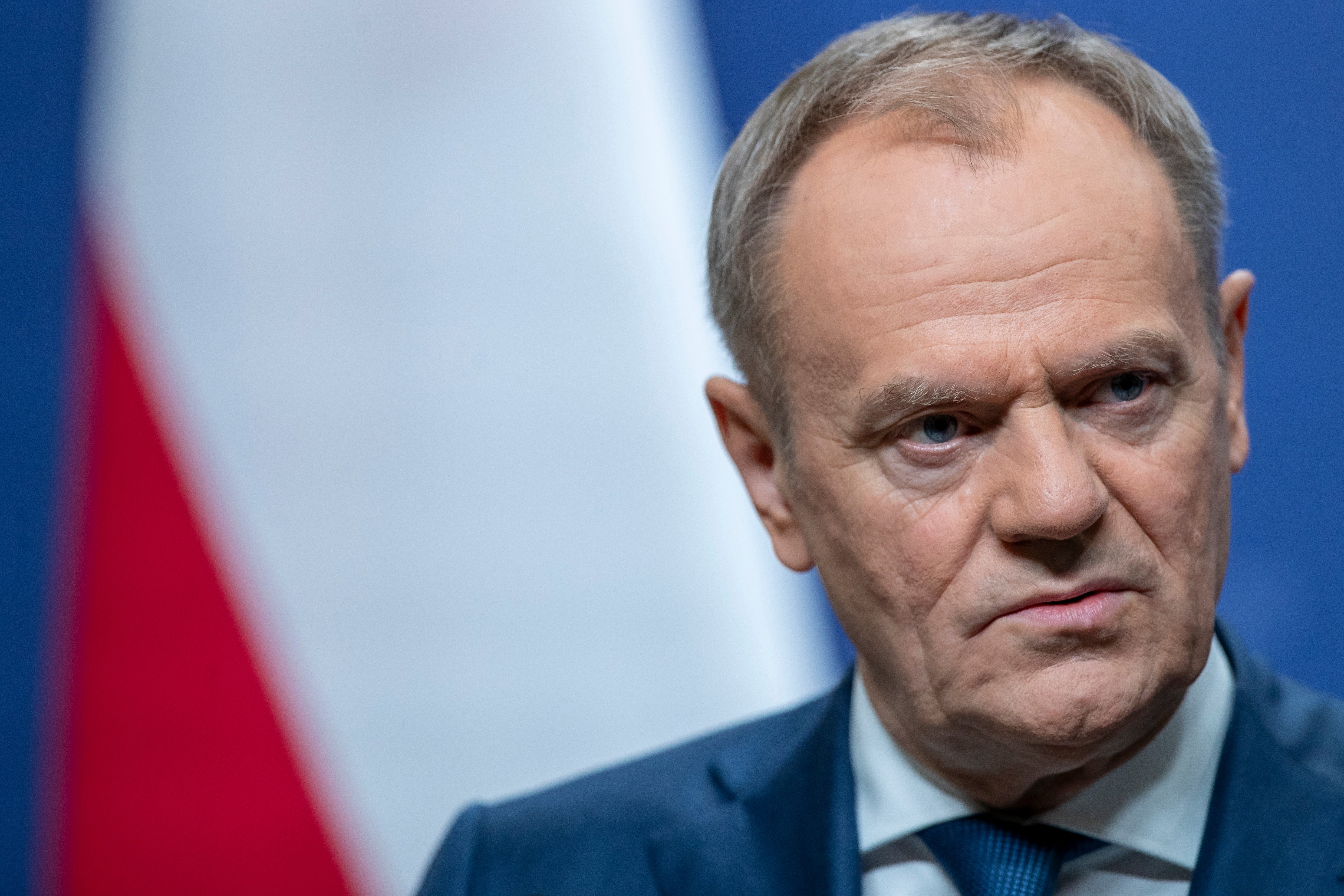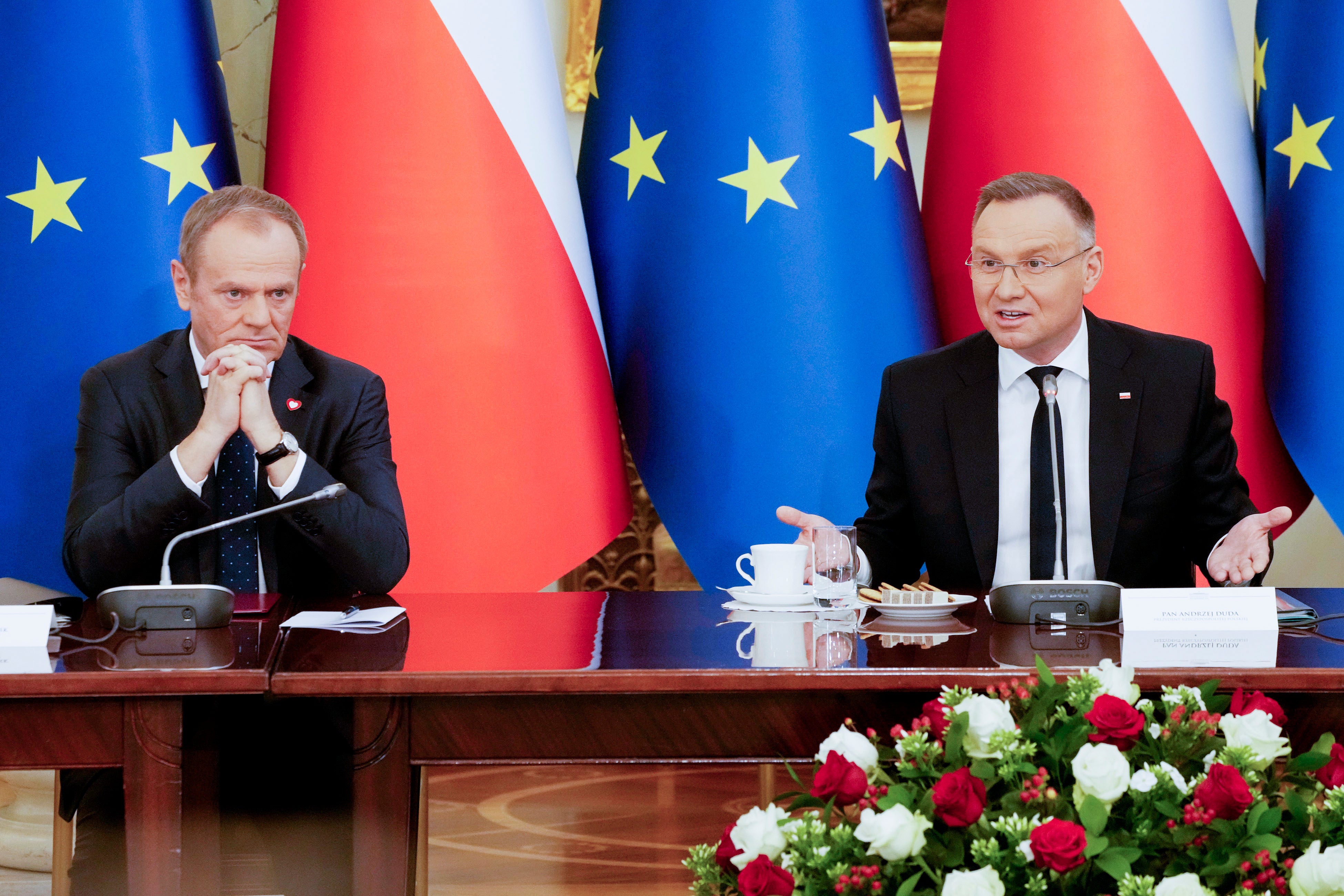Poland’s Tusk says future of liberal democracy across EU hinges on tougher migration policy
PM dismisses criticism that a plan to temporarily stop accepting asylum applications violates human rights

Your support helps us to tell the story
From reproductive rights to climate change to Big Tech, The Independent is on the ground when the story is developing. Whether it's investigating the financials of Elon Musk's pro-Trump PAC or producing our latest documentary, 'The A Word', which shines a light on the American women fighting for reproductive rights, we know how important it is to parse out the facts from the messaging.
At such a critical moment in US history, we need reporters on the ground. Your donation allows us to keep sending journalists to speak to both sides of the story.
The Independent is trusted by Americans across the entire political spectrum. And unlike many other quality news outlets, we choose not to lock Americans out of our reporting and analysis with paywalls. We believe quality journalism should be available to everyone, paid for by those who can afford it.
Your support makes all the difference.Poland’s Prime Minister Donald Tusk has declared that the future of liberal democracy across the European Union depends on adopting tougher migration policies.
Mr Tusk will be among European Union leaders meeting in Brussels on Thursday, with the bloc set to tighten its stance on migration as the issue becomes increasingly sensitive for governments – in particular those seeking to fend off challenges from the eurosceptic and nationalist right.
"The future of Europe and Poland will be played out in this area," Mr Tusk told the Gazeta Wyborcza daily, referring to border security. "The only question is whether right-wing populists or liberal democracy will provide it."
"Tomorrow and the day after tomorrow in Brussels we will defend the Polish border and we will use all legal instruments," Mr Tusk said in a later address to legislators. "Poland cannot be and will not be helpless."
His government is pushing for a plan to suspend the right to asylum for irregular migrants but President Andrzej Duda, whose approval is critical for it to take effect, condemned the proposal as a “fatal mistake,” warning it would block refuge for dissidents fleeing Belarus and Russia.
Mr Tusk’s government adopted a five-year plan aimed at bolstering Poland’s eastern border, saying it is necessary to counter hybrid warfare tactics by Russia and Belarus. Warsaw and the EU say the pair have orchestrated the situation by funnelling people from the Middle East and Africa to the border, something Minsk and Moscow deny.
The proposal has drawn protests from human rights groups. While Tusk insists the plan will safeguard Europe’s future, critics argue it risks undermining asylum protections. It has led to political tension as the plan heads to the Polish parliament and the upcoming EU summit.

Mr Duda argued in a speech in parliament that Russian President Vladimir Putin and Belarus President Alexander Lukashenko “are trying to destabilise the situation on our border, in the EU, and your response to this is to deprive people whom Putin and Lukashenko imprison and persecute of a safe haven. It must be some fatal mistake.”
Migration looks set to play a key role in a 2025 presidential election in Poland, which has been grappling with a migrant crisis on its border with Belarus since 2021.
Mr Tusk said Mr Duda's criticism of the asylum plan was "stupid" as the policy was aimed at migrants sent deliberately by Belarusian authorities.
"There has not been a single case of Belarusian opposition figures crossing the Polish border in groups organised by Lukashenko," he said. "Nobody is talking about violating human rights, the right to asylum, we are talking about not granting applications to people who illegally cross the border in groups organised by Lukashenko," he added.
Rising tensions over migration have led several EU states, including Germany and Italy, to adopt stricter policies. A ship carrying the first group of migrants to be processed in Albania under a deal with Italy arrived in the port of Shengjin on Wednesday morning, setting in motion the first scheme by a European Union state to divert asylum seekers abroad.
Italy has built two reception centres in Albania under its controversial programme, which aims to deter irregular arrivals to Italy but has also been criticised by rights groups who say it restricts migrants' right to asylum. The Libra, an Italian navy ship, docked at Shengjin, Reuters footage showed. Sixteen migrants were escorted into a newly built processing centre at the port, ringed by a high metal fence and adorned with Italian and EU flags.
In a letter to EU leaders on Monday, European Commission President Ursula von der Leyen said Russia and Belarus are “exercising pressure on the EU’s external border by weaponizing people, undermining the security of our union.” She called for a “clear and determined European response.”
In May, the EU agreed on a new Migration Pact, outlining updated rules and procedures for managing migration, but full implementation is not expected until mid-2026.
Ms von der Leyen also suggested forming more agreements with countries that either send migrants or serve as transit routes, to prevent them from continuing their journey. This would be similar to the EU’s existing deals with Turkey, Tunisia and Libya, where governments receive EU funding to limit illegal crossings and smuggling.
But in a policy U-turn from previous years, she proposed that migrants who have no right to stay in the EU be sent to “return hubs” in countries outside the EU, with which the bloc will strike deals.
Poland’s plan will be discussed at the upcoming EU summit this week in Brussels.
Reuters and Associated Press contributed to this report.
Join our commenting forum
Join thought-provoking conversations, follow other Independent readers and see their replies
Comments